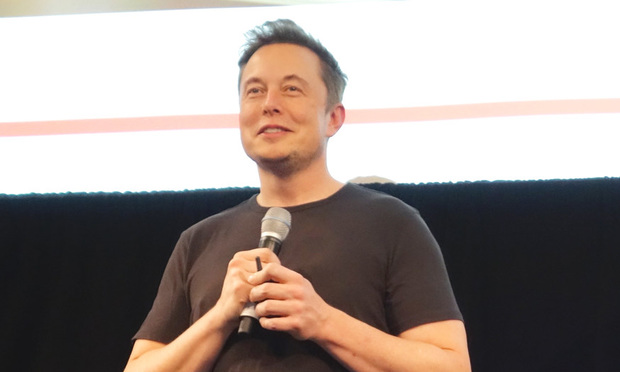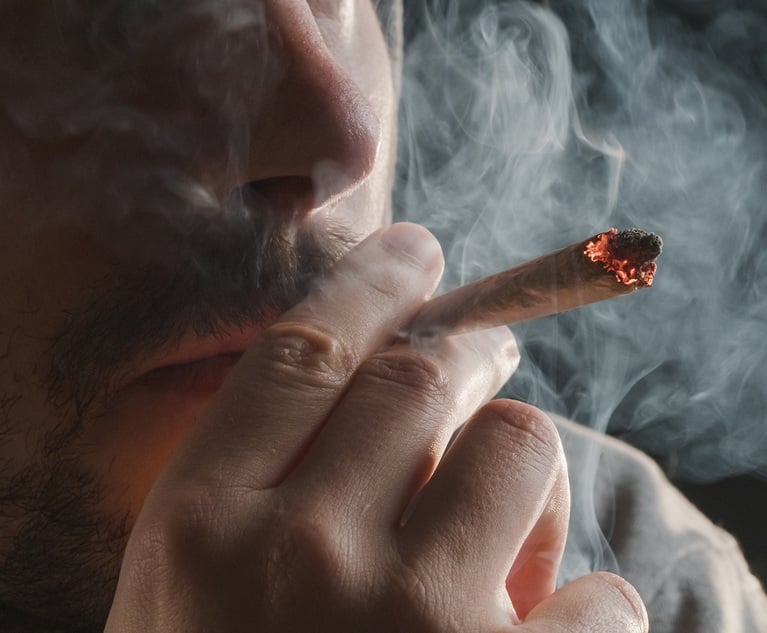Tesla's Musk Facing SEC Charges Over Tweets About Taking Company Private
On top of monetary penalties, regulators from the SEC are seeking to have Musk banned from serving as an officer or board member of a publicly traded company.
September 27, 2018 at 06:31 PM
4 minute read
The original version of this story was published on New York Law Journal
 Elon Musk. Photo: Wikimedia Commons
Elon Musk. Photo: Wikimedia Commons
Billionaire Elon Musk's boasts on Twitter that he had “funding secured” to take his electric vehicle company Tesla private—made after believing himself the target of unfair practices by short-selling traders—has landed him in hot water with federal regulators and it could lead to his departure from top positions at any of his publicly traded companies.
In a suit filed in the U.S. District Court for the Southern District of New York on Thursday, the Securities and Exchange Commission said Musk should have known that his Aug. 7 tweets about potentially taking the company public were reckless, since he didn't “have an adequate basis in fact for his assertions.”
“When he made these statements, Musk knew that he had never discussed a going-private transaction at $420 per share with any potential funding source, had done nothing to investigate whether it would be possible for all current investors to remain with Tesla as a private company via a 'special purpose fund,' and had not confirmed support of Tesla's investors for a potential going-private transaction,” regulators claim in their complaint.
In a statement, Musk pushed back against the allegations.
“This unjustified action by the SEC leaves me deeply saddened and disappointed,” he said. “I have always taken action in the best interests of truth, transparency and investors. Integrity is the most important value in my life and the facts will show I never compromised this in any way.”
As regulators noted, “investors reacted” to Musk's statements. By the close of trading on Aug. 7, Tesla's stock price was up nearly 11 percent from the previous day. Yet the reality was that Musk “had not even discussed, much less confirmed, key deal terms, including price, with any potential funding source.”
The decision set off a chain reaction of uncertainty, questions and confusion. According to the SEC, Tesla's head of investor relations sent Musk a text message 12 minutes after the tweet to ask, “Was this text legit?”
According to federal regulators, Musk's choice of a price suggested that perhaps it was not. His initial calculation of a per-share price with a 20 percent premium came to $419. According to regulators, “Musk stated that he rounded the price up to $420 because he had recently learned about the number's significance in marijuana culture and thought his girlfriend 'would find it funny, which admittedly is not a great reason to pick a price.'”
Shortly after 2 p.m. that day, Nasdaq, which requires a 10-minute heads-up on public statements about corporate events like going private, halted the trading of all Tesla shares.
In the hours after the tweet, Musk appeared to attempt to contain the fallout over his public statement, offering up other pieces of information through tweets, and responding on the social media platform. In a companywide email, he defended the move, while detailing a possible process for investors, while noting that the proposal was only possible “through a vote of our shareholders.”
It was later revealed that no actual details had been presented to the board. By Aug. 24, Musk announced the company was staying public, noting that “the majority of shareholders” had told him not to proceed.
“This was the first time that Musk publicly disclosed the obstacles to allowing current Tesla investors to remain invested if Tesla went private and thus corrected his multiple previous misstatements that any going-private transaction would allow all current shareholders to remain invested,” the SEC claimed.
On the next trading day, Tesla stock prices ultimately fell to a point 15 percent below where they closed the day of Musk's initial tweet.
In a statement, Steven Peikin, co-director of the SEC's Enforcement Division, said the celebrity status or reputation as a “technological innovator” doesn't give a corporate officer “license to take those responsibilities lightly.”
“Corporate officers hold positions of trust in our markets and have important responsibilities to shareholders,” Peikin said.
On top of possible civil penalties and disgorgement, federal regulators are seeking that Musk be barred as an officer or director of a publicly traded company, opening the potential for his removal from Tesla and other companies.
Related:
Musk Sued for Defamation by British Caver He Called 'Pedo Guy' on Twitter
Short Seller Sues Tesla, Elon Musk Over Take-Private Tweets
Tesla Gets Early Win in 'Non-Twitter' Securities Suit
This content has been archived. It is available through our partners, LexisNexis® and Bloomberg Law.
To view this content, please continue to their sites.
Not a Lexis Subscriber?
Subscribe Now
Not a Bloomberg Law Subscriber?
Subscribe Now
NOT FOR REPRINT
© 2025 ALM Global, LLC, All Rights Reserved. Request academic re-use from www.copyright.com. All other uses, submit a request to [email protected]. For more information visit Asset & Logo Licensing.
You Might Like
View All
'Better of the Split': District Judge Weighs Circuit Divide in Considering Who Pays Decades-Old Medical Bill

K&L Gates Files String of Suits Against Electronics Manufacturer's Competitors, Brightness Misrepresentations
3 minute read
Ill. Class Action Claims Cannabis Companies Sell Products with Excessive THC Content
4 minute read
Plaintiffs Attorneys Awarded $113K on $1 Judgment in Noise Ordinance Dispute
4 minute readTrending Stories
Who Got The Work
J. Brugh Lower of Gibbons has entered an appearance for industrial equipment supplier Devco Corporation in a pending trademark infringement lawsuit. The suit, accusing the defendant of selling knock-off Graco products, was filed Dec. 18 in New Jersey District Court by Rivkin Radler on behalf of Graco Inc. and Graco Minnesota. The case, assigned to U.S. District Judge Zahid N. Quraishi, is 3:24-cv-11294, Graco Inc. et al v. Devco Corporation.
Who Got The Work
Rebecca Maller-Stein and Kent A. Yalowitz of Arnold & Porter Kaye Scholer have entered their appearances for Hanaco Venture Capital and its executives, Lior Prosor and David Frankel, in a pending securities lawsuit. The action, filed on Dec. 24 in New York Southern District Court by Zell, Aron & Co. on behalf of Goldeneye Advisors, accuses the defendants of negligently and fraudulently managing the plaintiff's $1 million investment. The case, assigned to U.S. District Judge Vernon S. Broderick, is 1:24-cv-09918, Goldeneye Advisors, LLC v. Hanaco Venture Capital, Ltd. et al.
Who Got The Work
Attorneys from A&O Shearman has stepped in as defense counsel for Toronto-Dominion Bank and other defendants in a pending securities class action. The suit, filed Dec. 11 in New York Southern District Court by Bleichmar Fonti & Auld, accuses the defendants of concealing the bank's 'pervasive' deficiencies in regards to its compliance with the Bank Secrecy Act and the quality of its anti-money laundering controls. The case, assigned to U.S. District Judge Arun Subramanian, is 1:24-cv-09445, Gonzalez v. The Toronto-Dominion Bank et al.
Who Got The Work
Crown Castle International, a Pennsylvania company providing shared communications infrastructure, has turned to Luke D. Wolf of Gordon Rees Scully Mansukhani to fend off a pending breach-of-contract lawsuit. The court action, filed Nov. 25 in Michigan Eastern District Court by Hooper Hathaway PC on behalf of The Town Residences LLC, accuses Crown Castle of failing to transfer approximately $30,000 in utility payments from T-Mobile in breach of a roof-top lease and assignment agreement. The case, assigned to U.S. District Judge Susan K. Declercq, is 2:24-cv-13131, The Town Residences LLC v. T-Mobile US, Inc. et al.
Who Got The Work
Wilfred P. Coronato and Daniel M. Schwartz of McCarter & English have stepped in as defense counsel to Electrolux Home Products Inc. in a pending product liability lawsuit. The court action, filed Nov. 26 in New York Eastern District Court by Poulos Lopiccolo PC and Nagel Rice LLP on behalf of David Stern, alleges that the defendant's refrigerators’ drawers and shelving repeatedly break and fall apart within months after purchase. The case, assigned to U.S. District Judge Joan M. Azrack, is 2:24-cv-08204, Stern v. Electrolux Home Products, Inc.
Featured Firms
Law Offices of Gary Martin Hays & Associates, P.C.
(470) 294-1674
Law Offices of Mark E. Salomone
(857) 444-6468
Smith & Hassler
(713) 739-1250








